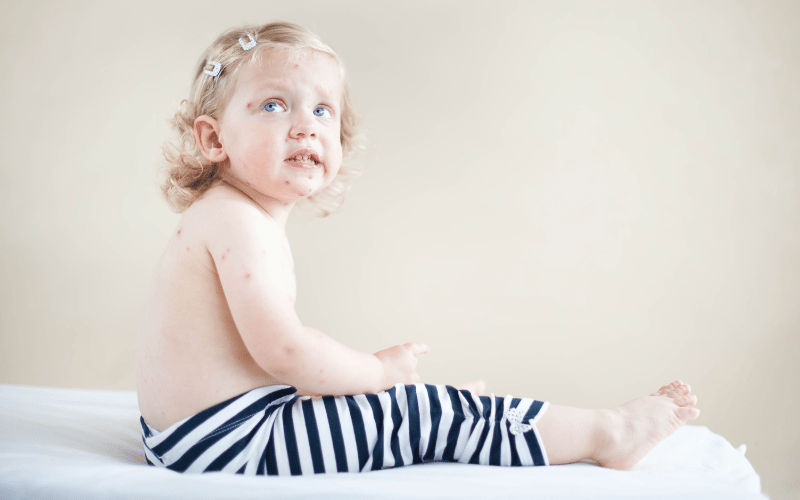Introduction
Chickenpox is a widespread childhood illness caused by the varicella-zoster virus. Although usually a mild infection, it can cause discomfort and stress for both children and their caregivers. As a parent, it’s crucial to know how to care for a child with chickenpox to ensure their well-being and fast recovery. In this extensive article, we will cover everything you need to know, including symptoms, treatments, and preventive measures, while addressing the most common concerns and questions related to chickenpox care.

Recognizing the Symptoms of Chickenpox
- Itchy Red Rash: The telltale sign of chickenpox is an itchy red rash that typically starts on the face and torso, spreading to other body parts. The rash develops into small, fluid-filled blisters that can be quite uncomfortable.
- Fever: A mild to moderate fever often accompanies the rash, making your child feel unwell and possibly fatigued.
- Headache: Headaches are common, especially in the early stages of the infection.
- Loss of Appetite: Your child may have a reduced appetite due to general malaise and discomfort.
- Fatigue: The combination of fever, headache, and itchiness can cause your child to feel tired and sluggish.
Soothing the Itch and Discomfort
- Keep Them Cool and Comfortable: Dress your child in loose, soft clothing to minimize irritation on their sensitive skin. Keep the room temperature cool to reduce the urge to scratch.
- Apply Calamine Lotion: Calamine lotion is a tried-and-true remedy for easing itchiness. Apply it gently to the affected areas as needed.
- Use Over-the-Counter Antihistamines: Antihistamines like Benadryl can help alleviate itching and make your child more comfortable. Consult your pediatrician for the appropriate dosage.
- Discourage Scratching: It’s essential to prevent your child from scratching the blisters, as this can lead to infection and scarring. Encourage them to pat or tap the itch instead.
- Trim Their Nails: Keep your child’s nails short and clean to minimize the damage if they do scratch.
Managing Fever and Pain
- Administer Acetaminophen: Acetaminophen (Tylenol) can be given to reduce fever and alleviate pain. Follow the recommended dosage for your child’s age and weight, and consult your pediatrician if you’re unsure.
- Avoid Aspirin: Do not give your child aspirin, as it can lead to a rare but severe condition called Reye’s syndrome.
- Encourage Rest: Make sure your child gets plenty of rest to help their body fight off the virus.
- Keep Them Hydrated: Encourage your child to drink plenty of fluids, especially water, to prevent dehydration.
Preventing the Spread of Chickenpox
- Quarantine: Keep your child away from school, daycare, or other social activities until the blisters have scabbed over, usually within 5-7 days of the rash appearing.
- Vaccination: The varicella vaccine is the best way to prevent chickenpox. Children should receive two doses, the first at 12-15 months and the second at 4-6 years.
Frequently Asked Questions about Caring for a Child with Chickenpox
How long does chickenpox last?
Chickenpox generally lasts 5-10 days, with the rash scabbing over within 5-7 days of appearance.
Can my child take a bath or shower during chickenpox?
Yes, a lukewarm bath or shower can provide relief from itching. Adding colloidal oatmeal or baking soda to the bathwater may further soothe the skin.
When should I call a doctor?
Consult your pediatrician if your child has a high fever, severe pain, difficulty breathing, or if the rash becomes infected. Also, seek medical advice if your child is at a higher risk of complications due to a weakened immune system.
Can adults get chickenpox?
Yes, adults can contract chickenpox, especially if they haven’t had it as a child or haven’t received the vaccine. Chickenpox tends to be more severe in adults than in children.
Can my child catch chickenpox more than once?
It’s rare, but possible. Once a person has had chickenpox, they usually develop immunity to the virus. However, in some cases, a person may get chickenpox a second time.
Conclusion
Caring for a child with chickenpox can be challenging, but with proper knowledge and treatment, you can ensure their comfort and speedy recovery. Remember to keep an eye on their symptoms, provide soothing remedies for itchiness, manage fever and pain, and prevent the spread of the virus. If you have any concerns, don’t hesitate to consult your pediatrician.